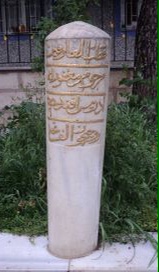Idris Bitlisi
This article includes a list of general references, but it lacks sufficient corresponding inline citations. (July 2011) |

Idris Bitlisi (c. 18 January 1457[1] – 15 November 1520), sometimes spelled Idris Bidlisi, Idris-i Bitlisi, or Idris-i Bidlisi ("Idris of Bitlis"), and fully Mevlana Hakimeddin İdris Mevlana Hüsameddin Ali-ül Bitlisi, was an Ottoman Kurdish religious scholar and administrator.
Even though many scholarly works mention Bitlis as Bitlisi's place of birth, a new research states that he was actually born in the district of Sulaqan in Ray in northern Iran.[1]
He wrote a major Ottoman literary work in Persian, named Hasht Bihisht, which began in 1502 and covered the reign of the first eight Ottoman rulers.[2]

Biography
Bitlisi's father,
Bitlisi was instrumental in the incorporation of the territories of
He died in
Bitlisi wrote extensively towards the end of his life; his best known work is "Selim Şahname", an epic history of Selim I's reign.
Hasht Bihisht
Bitlisi's Persian Hasht Bihist (also spelled Hasht Behest or Heşt Behişt) was written making explicit use of the stylistic and organizational models of Persianate historiography.[6] Most of the work's content derives best-known written by earlier Ottoman chroniclers.[6]
References
- ^ S2CID 204479807.
- ISBN 9971774887p 68
- ^ Yazici 2004, p. 490.
- ISBN 978-0-7914-5993-5.
- ISBN 978-0-8047-7570-0.
- ^ ISBN 978-0-521-62094-9.
Bibliography
- Uğur, Ahmet (1991). İdris-i Bitlisi ve Şükri-i Bitlisi (in Turkish). Kayseri, Turkey: Erciyes Üniversitesi Yayınları. ISBN 978-975-7598-17-6.
- Bayraktar, Mehmet (2006). Kutlu Müderris İdris-i Bitlisi (in Turkish). Istanbul, Turkey: Biyografi Net Yayınları. ISBN 978-975-00394-7-8.
- Kirlangic, Hicabi (2001). Selim Şahname (in Turkish). Ankara, Turkey: Works on Culture Series, Turkish Ministry of Culture. ISBN 975-17-2588-7.
- Yazici, Tahsin (2004). "ḤOSĀM-AL-DIN ʿALI BEDLISI". Encyclopaedia Iranica, Vol. XII, Fasc. 5. p. 490.
Further reading
- Dehqan, Mustafa (2024). "From Historian to Poet: A Checklist of the Persian Poems of Idrīs Bidlīsī (Hašt Bihišt VI, Nuruosmaniye 3209)". DABIR: 1–12. .
- Genç, Vural (2019). "Rethinking Idris-i Bidlisi: An Iranian Bureaucrat and Historian between the Shah and the Sultan". Iranian Studies. 52 (3–4): 425–447. S2CID 204479807.
- Genç, Vural (2021). "An Iranian Shāh-nāma Writer at the Court of Bāyezid II: Malekzāda Āhi". Journal of Persianate Studies. 13 (2): 119–145. S2CID 237805512.
- Markiewicz, Christopher (2019). The Crisis of Kingship in Late Medieval Islam: Persian Emigres and the Making of Ottoman Sovereignty. Cambridge University Press.
